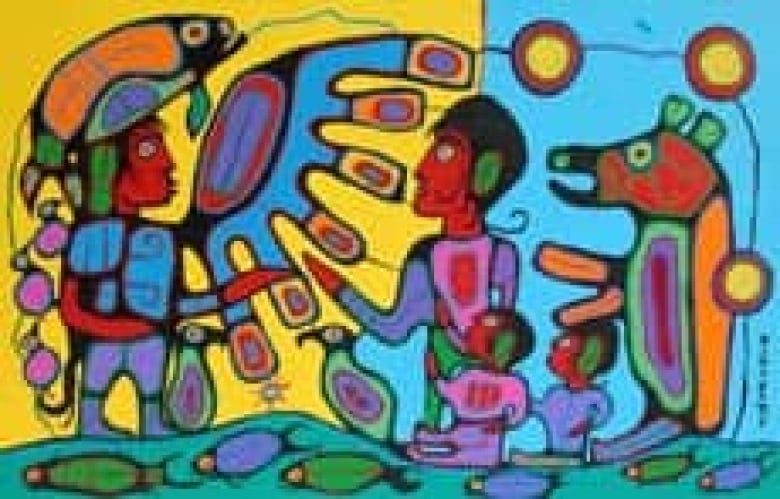Iconic Canadian painter Norval Morrisseau dies at 75
Norval Morrisseau, one of Canada's foremost aboriginal artists and the founder of the Woodland style of painting, has died.

The Ojibwa shaman and self-taught artist who grew up in northwestern Ontario passed away early Tuesday morning in Toronto General Hospital after years of suffering from advanced Parkinson's disease. He was 75.
In his art, Morrisseau took pleasure in "the potential, to do more, better," Gabe Vadas, the artist's companion and caregiver, told CBC News on Tuesday.
However, it became "extremely frustrating" that he could not continue to paint in recent years," Vadas said.
Over the past year at home, Morrisseau focused on "other things rather than worrying about artwork, focused on the finer points of life, the other things that he enjoyed," including cooking and his garden, Vadas said.
Known as one of the greatest painters — native or otherwise — that Canada has ever produced, Morrisseau painted for more than 50 years and gained an international reputation as one of Canada's most original master artists.
In 1989, he had the distinction of beingthe lone Canadian painter invited to Paris's Museum of Modern Art for the Magicians of the Earth exhibition. The French dubbed him the "Picasso of the North."
A member of the Royal Canadian Academy of Art since 1970, Morrisseau was known for taking traditional icons that had been expressed in his native culture in rock art and birch bark scrolls, then translating those images into the Western media of easel painting and printmaking.
He became celebrated as the founder of what became commonly called the Woodland style or school of painting, giving way to a revitalization of Anishnabe iconography. His works, filled with striking colour,inspired generations of Canadian and American native artists as well as imitators, spawning an entire industry of fake reproductions.
"His art broke ground. Nobody had done what he had done," said Matt Steffich, a gallery owner who carries the artist's work at his Salt Spring Island, B.C., venue.
"He had the creativity to come up with something new" and, subsequently, "has been emulated and copied by hundreds of hundreds of artists."
Morrisseau's vibrant pieces "didn't need explanation most times," added Steffich, who said he began his career in art when he borrowed $1,000 from his mother to buyaMorrisseau painting in the 1980s.
Though he was serious about his work, the artist would sometimes quip to inquiring fans that his paintings "mean whatever you want them to mean — just buy them," Steffich recalled.
In 1978, Morrisseau became a member of the Order of Canada.He also received honorary doctorates from Montreal's McGill University and McMaster University in Hamilton. The Assembly of First Nationspresented him with its highest honour in 1995, a presentation of an eagle feather.
In his final months battling Parkinson's disease, the artist was using a wheelchair in a residence in Nanaimo, B.C. He was unable to paint because of his poor health and is believed to have completed his last work in 2000.
"Norval Morrisseau's courageous and often controversial approach to his work was instrumental in encouraging First Nations people to know their spirituality, history and culture in order to better understand themselves," Assembly of First Nations National Chief Phil Fontaine said Tuesday in a statement.